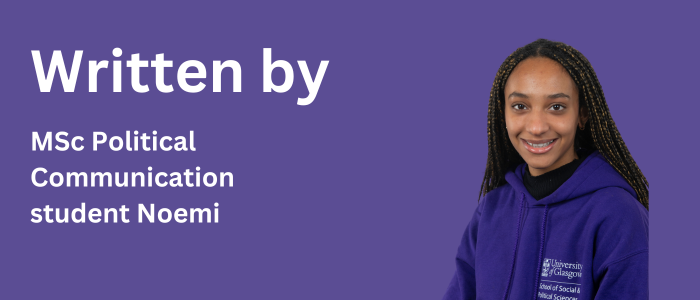Preparing for my dissertation
Published: 8 April 2025
MSc Political Communication student Noemi shares the process of preparing for her dissertation throughout her Masters and support offered by the university
Writing a dissertation can be a daunting process, and sometimes, even just thinking about dealing with such a massive project can make you feel stressed. As a Master's student, this will be my second time embarking on this adventure, as my undergrad degree required me to write one as well. However, I know that this wasn't the same for all the classmates in my cohort, and I understand that jumping into the unkown can cause people to feel even more confused and lost. Thankfully, the uni has many resources available to guide you in the process, plus I've put together some tips I collected through the past year. So, don't fret my friends, we're all in this together.
The first semester: the initial stages
Having graduated the summer before I started my postgrad, the first semester started not too long after I had submitted my first-ever dissertation. So you can imagine how I must have felt during the first week of the semester when the magic word was repeated to me in multiple classes straight away. I'm not gonna lie, I immediately panicked when I realised I had to start thinking about a new topic after I felt I had just finished writing my first research paper. Nonetheless, I was able to calm down when I saw the amount of support I would be able to receive from the very beginning.
My programme did, in fact, require us to take a Research Design course in which an array of methodologies were covered as well as how to find a research question, manage ethical concerns, and write a proposal. During the seminars, we were able to discuss how making the right choices for our research could impact the scope of our projects. What I found particularly useful from this class was that we were called to pick a topic we were interested in and, throughout each week, we would relate all that was learnt during the lectures to our specific idea. This was not only useful to me to get started thinking about how I wanted to develop my dissertation, but my nosey self also loved hearing about everyone else's research interests. Having to submit a research proposal as a final assignment for this class allowed me to receive precious feedback on my idea and how to tweak it for the real thing.
Second semester prep: the winter break
My personal advice as a student is to always try and make the most out of your winter break. While this is a great time to relax and recuperate energy surrounded by lovely food and company, keeping up with at least some uni work always make the long month of January a lot more bearable. This is why I always like to sprinkle a couple of readings here and there to keep the brain active. Doing some preliminary readings for my project during this period was not as bad as I thought as I got to read about topics I felt passionate about while being snuggled up in a blanket with a cup of tea in my hands.
The second semester: now we mean serious business
This is when things get serious. If before this we were still investigating potential topics and methods, we now kind of need to make up our minds about at least some general aspects of our project. I was asked to submit a working title and a short description of what I intended to do around mid-February so that I could get assigned a supervisor. Once again, my classmates and I weren't alone in making all these kinds of decisions, as dissertation support classes are available throughout the whole semester.
The one appointment I wouldn't miss at all, however, is your programme-specific dissertation workshop. Mine was held by our programme convenor and it was the perfect chance to get feedback on the different ideas we had at the time, help to choose between topics and how to word our question. After this, I was able to submit my idea on the Moodle page dedicated to the dissertation and wait for my supervisor allocation. On that note, make sure you consult this page throughout the semester, it contains videos, readings and even quizzes to make sure you know what is expected of you and how to best achieve it.
We have now reached the final step of dissertation prep, and the most exciting one, which is discovering who your supervisor will be. We got the notification during one of our classes and I can assure you no one was paying attention to the lecture after that. This is a long-awaited moment because it marks the beginning of the real thing. Once you discuss your project with them you are indeed ready to start working on your actual propoal, ours was due mid-April and, therefore, officially initiate dissertation writing. Your supervisor might be an academic you are already acquainted with or someone you don't know at all, however, thi should not scare you as being unfamiliar with them, like in my case, is the perfect opportunity to grab a coffee and get to know each other!
As per usual, I'd like to leave you with some extra tips:
- Remeber to check the resources the uni leaves at your disposal. You'll receive emails about dissertation workshops thoughout the whole year, keep an eye on them!
- Organise study groups with your classmates whenever you can. Your dissertation is your big independent project but that does not mean you have to be alone during this process. Regularly meeting with friends, especially during the summer semester can be a lifesaver.

First published: 8 April 2025

